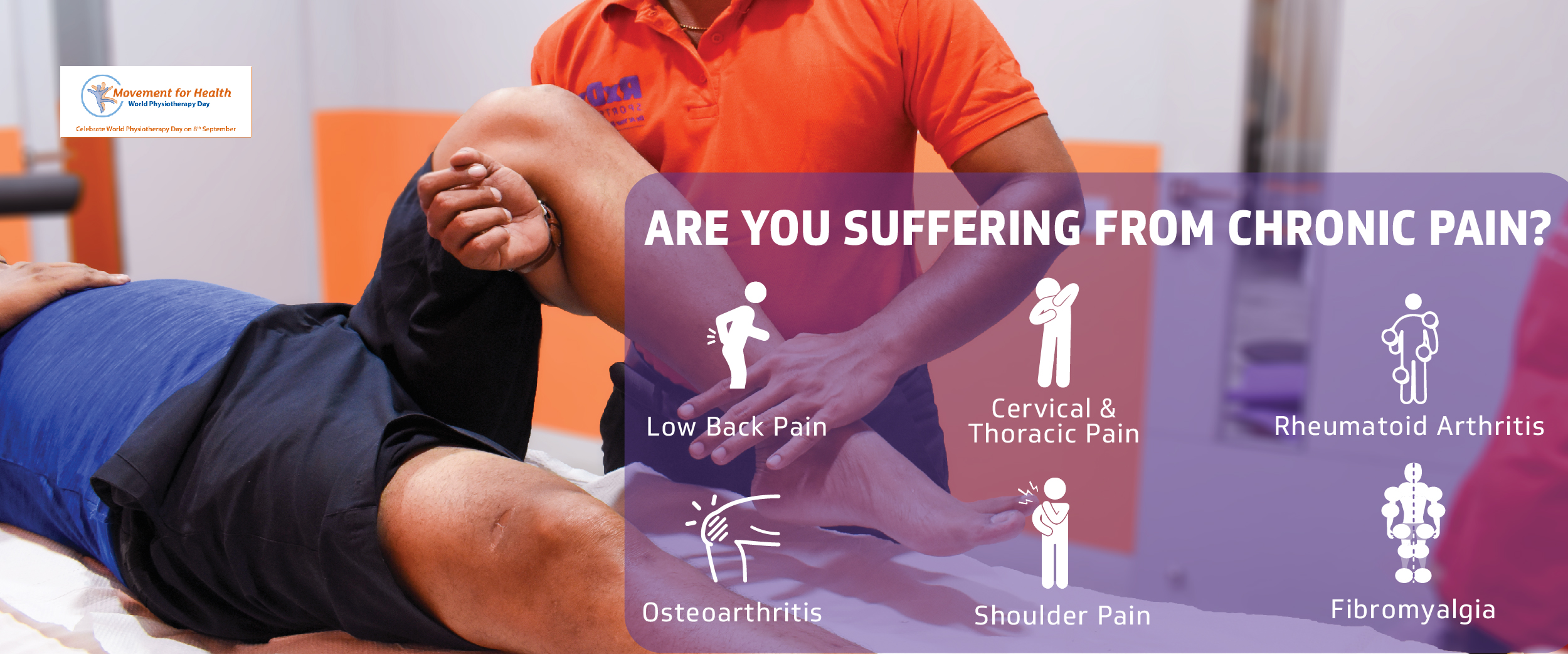
Pain is a part of life. We all get headache, stomachache or toothache in our day to day life. If we get injured, then also we get pain. These kinds of pains usually resolve by itself or with rest and medication. Sometimes we even need to see our primary physician if pain continues for 2-3 days. The doctor prescribes appropriate pain killers for the specific condition so that we can get relief.
Chronic pain is different from normal pain. In case of chronic pain, the body continues to send signals to the brain even after an injury heals. It can last for many weeks or months. Chronic pain can affect your movement, flexibility and strength and disturb your daily tasks and activities.
The pain that lasts for 12 weeks or more is called chronic pain. The pain can be sharp, dull, burning or throbbing. It may be steady or intermittent, come and go without any reason. It can happen in any part of the body.
Some of the most common examples of chronic pain are:
- Lower back pain
- Headache
- Neck pain
- Joint pain
- Neurogenic pain (pain caused due to nerve damage)
- Post-trauma pain
- Psychogenic pain
- Postsurgical pain
What are the causes of chronic pain?
Chronic pain occurs when nerves or muscles get damaged due to some previous injury like a sprain or pulled muscle. The nerve damage makes the pain to last longer. In case of chronic pain, treating the injury does not resolve the pain. However, in some cases, people may experience chronic pain even without any history of injury. The exact cause in such cases may not be clearly known.
Common conditions that may cause chronic pain are:
- Infections
- Arthritis
- Migraine
- Nerve damage
- Chronic fatigue syndrome
- Repetitive stress injury
- Fracture
- Fibromyalgia
- Cancer
- Surgery
What symptoms are related to chronic pain?
Symptoms which occur along with pain may include:
- Depression
- Anxiety
- Fatigue
- Nausea
- Impaired mental function
- Poor sleep
- Decreased appetite
- Poor coordination
What is the treatment for chronic pain?
The frequency and severity of chronic pain differ from person to person. So, the treatment plan is created according to the specific conditions. Lifestyle remedies, medications, exercises or a combination of these is usually used to treat chronic pain.
Medications:
Medications which are frequently used for treating chronic pain include:
- Pain killers like acetaminophen (Paracetamol) or NSAIDs (Nonsteroidal anti-inflammatory drugs) such as Aspirin or Ibuprofen.
- Strong pain relievers like Opioid drugs including morphine or codeine
- Antidepressants and Anticonvulsants to treat other related symptoms like anxiety, depression, insomnia etc.
Medical procedures:
Medical procedures which can provide relief from chronic pain may include:
- Nerve block: An injection is given near the nerve which prevents it from sending pain signals to the brain
- Electrical stimulation: It reduces pain by sending mild electric currents into your muscles
- Acupuncture: It involves lightly pricking your skin with needles to relieve pain
- Surgery: This is usually the last option. It is done to which correct injuries that may have healed improperly.
Some other conservative remedies for managing chronic pain are:
- Physiotherapy or physical therapy
- Psychotherapy
- Yoga
- Massage
- Meditation
Physical therapy and chronic pain
Physiotherapy or Physical therapy is often one of the best options you can choose when you have chronic pain. It can improve your strength and help you move and feel better. Ask your doctor to recommend a physical therapist. Typically, you will need a series of visits, and you should also practice some of the exercises at home for the best results.
How does Physical Therapy help in chronic pain?
Physical therapists are highly skilled and trained not only in treating pain, but also its source. They look for areas of stiffness or weakness that may be adding stress to the parts that hurt. They treat those areas with certain exercises to ease pain and help you feel better.
In a physical therapy session, you may do a mix of:
- Strengthening exercises
- Pain relief exercises
- Stretching
- Hot and cold packs
- Massage
- TENS and ultrasound (Transcutaneous electrical nerve stimulation)
Everyone’s body is different that’s why each person responds to physical therapy differently. Your activity level, lifestyle, body type, and habits can affect your plan. The key is to stick with it and complete the recommended treatment course.
Therefore, if you are suffering from any kind of pain from a long time and you have not got relief from medications, then you should try physiotherapy. We have a fully equipped physiotherapy department at RxDx, which is run under the supervision of expert physiotherapists who have good experience in handling chronic pain cases. So, call and make an appointment soon!
Compiled By,
Dr Manjari Bansal– Content Writer, RxDx
Inputs given by,
Mr Ashwani Sinha – Chief Impact Officer, RxDx
For further details, please contact: 080-49261111, 6745-8111
Download RxDx Smart Healthcare App Now!!!



